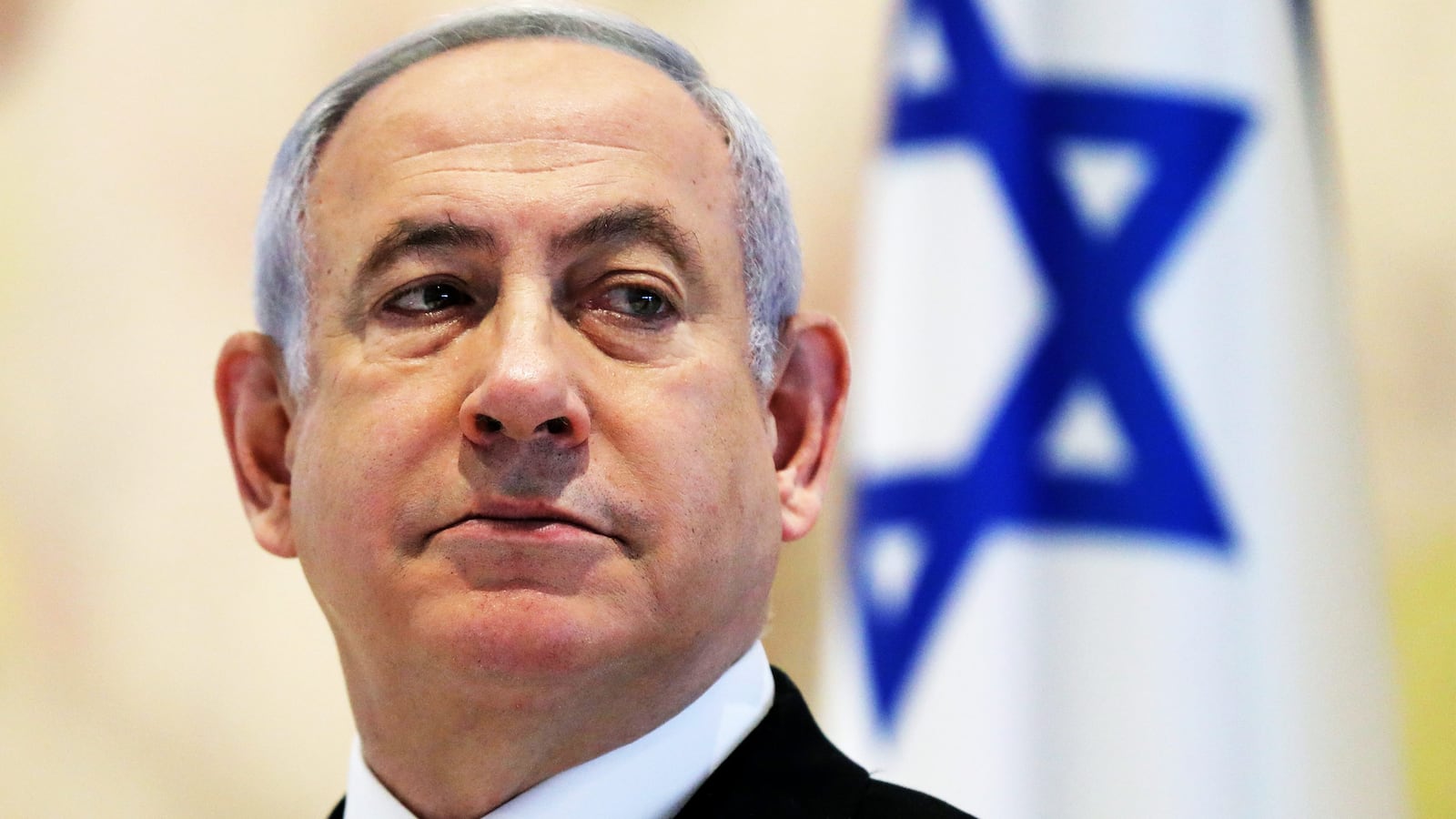HAIFA, Israel—Benjamin Netanyahu made it to the finish line on his knees, covered in dust from a battlefield of his own making, his legacy in shambles.
“In the end,” tweeted Anshel Pfeffer, his biographer, “what we’ll remember from these days is the way Netanyahu, his proxies and his personal machine of hate were happy to exploit any rabbi, any guru, to desecrate every fallen soldier and to humiliate every bereaved family so as to try to protect his unholy government.”
Ultimately, the same pitiless political instincts that kept Netanyahu in power for a dozen years—that made friend and foe alike view him as an unstoppable force—proved to be his undoing.
His rule will be ended by a motley association of political parties ranging from the mainstream left, through the nationalist right, and unto the Islamic Movement of Israel, which became the first Arab-majority party in the nation’s history to join a governing coalition. The single thread holding this group together? Their determination to oust the increasingly authoritarian Netanyahu, who is on trial for a range of corruption charges.
Netanyahu entered Israel’s national stage on July 4, 1976, under tragic circumstances. His brother, Yoni, was the only Israeli officer killed in a daring operation to rescue Israel-bound hostages held by guerrillas of the Popular Front for the Liberation of Palestine at Entebbe airport in Uganda. Yoni instantly became a national hero.
Bibi, the younger brother, was 26 years old. It fell to him to inform his parents of their eldest son’s death.
The loss of his brother became part of Benjamin Netanyahu’s personal myth, but his career has been guided by two unrelated, parallel threads: his adoption of the hardline, right-wing world-view of his father, Professor Benzion Netanyahu, and the stone-cold tactics he used to crush any potential rivals—and more than a few of his allies.
In fact, it was a scandal that launched his political career in the first place. In 1993, Netanyahu, then 44, was running in the primary election to lead the Likud, Israel’s traditional, large-tent right-wing party. His rival was David Levy, mayor of Beit Shean and an up-and-coming Likud star.
Mid-campaign, Netanyahu announced that he required free air time on the nation’s top national news broadcast to reveal a matter of national security.
Arriving on set, he declared that “one man, who is surrounded by not a small group of criminals,” was blackmailing him with a sex tape of him with his mistress, trying to force him to drop out of the race.
“Is the affair true?,” asked the astounded news anchor. “Yes,” Netanyahu replied, breezily, before continuing with his claim.
“We know who is behind this attempt,” he said. “Someone who uses the methods of spying, recording and breaking in, is not worthy to be a leader and should be in prison.”
Netanyahu did not mention Levy’s name, but he didn’t have to. The implication that this Moroccan-born politician was an outsider with criminal intent was clear to the Israeli audience.
A police investigation later revealed that the entire drama had been cooked up by Netanyahu. There was no video tape, and Sara, his third wife, had simply received an anguished call from the husband of the woman engaged in the affair with Netanyahu.
It was, it seems, Netanyahu’s effort to present himself as a victim rather than as a disloyal husband of a young wife who had just given birth to their second son.
Netanyahu had established the template which would guide the rest of his political career: destroy rivals by any means necessary, lie and hurl racist slurs at perceived opponents, dominate live television appearances, and never, ever apologize.
In 2021, Netanyahu’s efforts to crush his rivals finally backfired. The incoming prime minister Naftali Bennett, Avigdor Lieberman, and Gideon Saar—three of the leaders who formed the coalition that unseated him—are all his former top aides.
Netanyahu set himself up for failure by alienating natural allies and counting on marginal extremist groups for a parliamentary majority.
The overtly racist and homophobic Religious Zionism party, which Netanyahu himself fashioned out of three splinter groups, turned on him by refusing to join any government which included an Arab-majority party– in this case Raam, the Israeli Islamic Movement’s political branch, whom Netanyahu, who has spent much of his career reviling as "terrorist lovers," also needed to achieve his dream of a majority.
Religious Zionism, a party of marginal fanatics and fantasists, which had few chances of being elected to the Knesset without Netanyahu's overt support, is now relegated to the opposition alongside Netanyahu's Likud.
The Islamists—who themselves would not have broken away from the Arab-majority Joint List bloc had Netanyahu not enticed them with promises he immediately broke, have joined Lapid's coalition of change. Together, the Islamic Movement, Religious Zionism and a shrinking Likud base ultimately deprived Netanyahu of a fifth term in office.
The last three years of Netanyahu’s political career have been dominated by his alleged corruption, his efforts to evade justice, and the desperate measures he was willing to undertake to hold onto office, whatever the cost. Raging against what he calls a left-wing coup d'état, Netanyahu responded to charges of fraud, bribery and breach of trust by attempting to subvert the rule of law, including by ordering the illegal closure of the Knesset in March 2020, and trying to unlawfully install a crony as minister of justice in April of this year.
In recent weeks, he has offered rivals increasingly outlandish deals so as to retain power, including rotation agreements in which he purportedly would allow someone else to serve as prime minister for an initial period of time. Israeli social media erupted with a new meme: “I can reveal that Netanyahu offered me the post of prime minister if only I’d…”
“No one believes a word he says,” Bennett said earlier this week, announcing he was joining the opposition’s team of rivals and leaving his former mentor in the dust.
Netanyahu’s defeat comes on the heels of a grueling month in which Israel saw Jewish-Arab strife in all its major cities, and an 11-day battle with the Hamas militia that rules Gaza, in which more than 250 Palestinians and 12 Israelis were killed.
Netanyahu—who accused Arab-Israeli citizens of wanting to “exterminate all Jews” in a 2020 electoral message—was seen as a principal inciter of the violence.
Jafar Farrah, head of the Mossawa Center, a non-governmental organization that promotes equality for Arab citizens of Israel, said in an interview that Netanyahu had “no interest in treating Arab-Israelis as citizens. He needed another round of conflict. He was looking for a crisis. He created this crisis, for his own reasons, to try to erase his trial.”
For a full generation of Israelis, Benjamin Netanyahu’s name is synonymous with the role of prime minister. “I can remember that there was someone before him, but I was so young that I didn’t understand anything. I was a child,” Wiaam Azzam, the 30-year-old manager of Lux, a restaurant in the liberal city of Haifa, told The Daily Beast. Lux’s Wednesday night patrons appeared to be in a festive mood.
“I’m happy,” Azzam said as news alerts announced the change of government. “It is time.”




